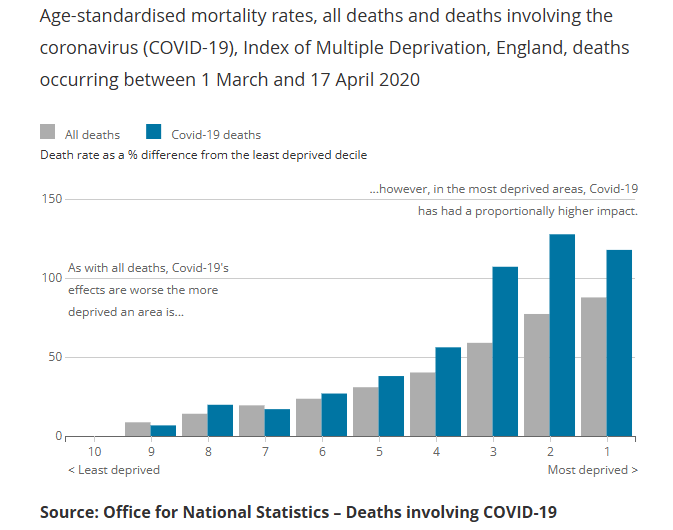Covid-19: Economic Recovery and Inequalities that Influence Health and Wellbeing
Published: 18 May 2020
The message that “we’re all in it together” has spread far and wide in recent months - but is that true?
Evidence tells us that we are not all affected in the same way or to the same extent by Covid-19.
In the short-term, our national response to Covid-19 is likely to affect health and exacerbate inequalities for particular groups of people including (but not limited to) older people, people with mental health problems, people with a disability, people on low income and workers on precarious contracts. People living in the most deprived areas of England are more than twice as likely to die with Covid-19. There have also been countless stories in the media about the impact of Covid-19 on the number of people living in poverty and on food insecurity and increased demand for food banks.

Models, when deployed alongside other evidence, can provide valuable information to support decision-making. Modelling complex systems accurately is really hard, and even more so when people are working very quickly to respond to an emerging and rapidly changing situation such as a pandemic. Over the past few months attention has turned to modellers to help predict a range of things related to Covid-19 including how the disease would spread, who would be greatest affected, how to prevent transmission and how we release lockdown. Not all the models developed have hit the mark, and there are certainly challenges around model transparency to support replication and evaluation. In addition, the politics of modelling, and evidence-use more generally, have been thrown into sharp relief by this pandemic.
In SIPHER, we are working to understand the implications of Covid-19 for inequalities, and to hardwire consideration of inequalities and their impact on health and wellbeing into wider decision-making processes. Ultimately, we hope this will lead to better health and a more resilient system as a whole. We are focusing on three areas.
Firstly, we are developing a detailed understanding of the unequal impact of Covid-19 on different places and people, and over time, to understand who is most affected. In a few short days we have identified almost 150 factors we think play into how the pandemic, and responses to it, will impact unequally on health and wellbeing. Factors including the availability of official information, transport availability, isolation, neighbourhood deprivation, anxiety, household composition, lack of control, and many more. We are now starting to map out how all these interlinked moving parts relate to one another in a complex web of dynamic and non-linear relationships, and are in the process of using this information to guide our modelling.
Secondly, we are engaging across sectors and communities of practice to understand the most pressing challenges and to help build solutions. This includes working with Sheffield City Council, Greater Manchester Combined Authority and the Scottish Government to understand how Covid-19 has shocked our economic system and what this means for modelling whole-systems effects of economic policies. Evidence does not simply speak for itself and that is why in SIPHER we co-produce our research directly with policy-makers at different levels of government. Together, we are exploring how to build a fairer society that considers health, wellbeing and sustainability in all decision-making and increases resilience to future shocks. Ensuring that we develop an inclusive economy through a focus on evidence-based approaches that balance social, economic and environmental sustainability with prosperity will be key to this.
Thirdly, we are starting conversations and encouraging decision-makers to keep inequalities in mind as attention turns to how we re-build the economy over the longer-term. Although the context in which this thinking is applied will be challenging, by sharing evidence and promoting discussion of trade-offs and the differential impact of policies (particularly on the most disadvantaged in society) we hope to avoid the ‘growth at all costs’ and assumed trickle down associated with the response to the last recession. As local businesses, the organisations and networks that support them, and governments start to focus their attention on economic recovery, we see guidance emerging on how best to focus those efforts (e.g. Rescue, recover, reform: A framework for new local economic practice in the era of Covid-19 and Build Back Better in Greater Manchester). This economic recovery phase is an opportunity for us to reflect on what is most important to us all as we seek to restart and revitalise the economy. The WHO has already highlighted how countries affected early in the pandemic – for example Germany and South Korea – are looking at ways to boost sustainability in their recovery plans. In SIPHER, we believe that as well as embedding sustainability, our local and national recovery plans should make a priority of how best to reduce inequality, which will ultimately benefit health and wellbeing.
In short, the evidence tells us that we are not all in this together and in SIPHER we are committed to ensuring those who are worst affected are visible and represented in our economic recovery plans. Such a focus on reducing inequality can only benefit health and wellbeing, which in turn will help to strengthen and rebuild our economy.
Links:
- Deaths involving COVID-19 by local area and socioeconomic deprivation: deaths occurring between 1 March and 17 April 2020 - Data and analysis from Census 2021
- Mitigating the wider health effects of covid-19 pandemic response BMJ 2020; 369 doi: https://doi.org/10.1136/bmj.m1557 (Published 27 April 2020)
- Sills, J., Barton, C.M., Alberti, M., Ames, D., Atkinson, J.A., Bales, J., Burke, E., Chen, M., Diallo, S.Y., Earn, D.J.D., Fath, B.
 , Feng, Z., Gibbons, C., Hammond, R., Heffernan, J., Houser, H., Hovmand, P.S., Kopainsky, B., Mabry, P.L., Mair, C., et al. (2020). Call for transparency of COVID-19 models. Science 368 (6490) 482.2-483. 10.1126/science.abb8637.
, Feng, Z., Gibbons, C., Hammond, R., Heffernan, J., Houser, H., Hovmand, P.S., Kopainsky, B., Mabry, P.L., Mair, C., et al. (2020). Call for transparency of COVID-19 models. Science 368 (6490) 482.2-483. 10.1126/science.abb8637. - Rescue, recover, reform A framework for new local economic practice in the era of Covid-19 - Centre for Local Economic Strategies
- Build Back Better - Greater Manchester
- Planning for the economic recovery from COVID-19: A sustainability checklist for policymakers - Stephen Hammer & Stephane Hallegatte -
- Why “health” matters to “the economy”. An economy with wellbeing at it's heart - SIPHER Blog - 3 February 2020
First published: 18 May 2020
<< Blog

By Lucy Gavens, SIPHER Consortium Manager

